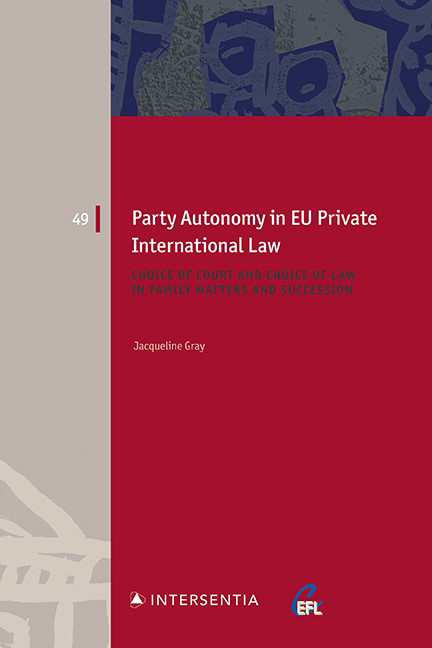 Party Autonomy in EU Private International Law
Party Autonomy in EU Private International Law Published online by Cambridge University Press: 25 May 2021
INTRODUCTION
This examination has arrived at the end point of its journey through the various aspects involved in exercising a choice of court or choice of law within the present EU private international law framework relating to family matters and succession. By employing a simultaneous approach, the provisions that allow for party autonomy within the relevant instruments have been evaluated in successive stages: (i) the preliminary elements of choice; (ii) the content of choice; and (iii) the variables aff ecting choice. This final step involves a reconsideration of the established manifestation of party autonomy with a view to establishing coherence with the parameters attached to this concept in the Union context.
This concluding synthesis brings together the strands of this investigation by integrating the findings back into the context of the values through which this evaluation has been conducted. In the interests of clarity, the synthesis will invert the order of the two introductory chapters that established these principles, presenting the impact of the relevant provisions in view of the EU legislator‘s objectives in unifying Member States‘ private international law rules (11.2.–11.4.), before taking the final step of (re-)considering the manifestation of free will in the EU‘s private international law rules relating to family matters and succession in light of the findings that have been established (11.5.).
The following sections follow the pattern established in the main chapters by examining (i) the general findings; (ii) the interplay between related areas; and (iii) the gaps to be addressed. The final considerations, set out in 11.6., will propose a number of closing suggestions in view of the key findings of this book.
LEGAL CERTAINTY
Turning attention first to the impact of party autonomy upon the specific obstacles that the unification of the EU‘s private international law rules on family matters and succession seeks to address (see Chapter 3), this synthesis begins by recapping on the aspects of legal uncertainty that international parties face in exercising their right to free movement in the European Union. Legal certainty is a difficult principle to succinctly describe, and its definition is not comprehensively examined in the relevant instruments or accompanying documentation.
To save this book to your Kindle, first ensure [email protected] is added to your Approved Personal Document E-mail List under your Personal Document Settings on the Manage Your Content and Devices page of your Amazon account. Then enter the ‘name’ part of your Kindle email address below. Find out more about saving to your Kindle.
Note you can select to save to either the @free.kindle.com or @kindle.com variations. ‘@free.kindle.com’ emails are free but can only be saved to your device when it is connected to wi-fi. ‘@kindle.com’ emails can be delivered even when you are not connected to wi-fi, but note that service fees apply.
Find out more about the Kindle Personal Document Service.
To save content items to your account, please confirm that you agree to abide by our usage policies. If this is the first time you use this feature, you will be asked to authorise Cambridge Core to connect with your account. Find out more about saving content to Dropbox.
To save content items to your account, please confirm that you agree to abide by our usage policies. If this is the first time you use this feature, you will be asked to authorise Cambridge Core to connect with your account. Find out more about saving content to Google Drive.